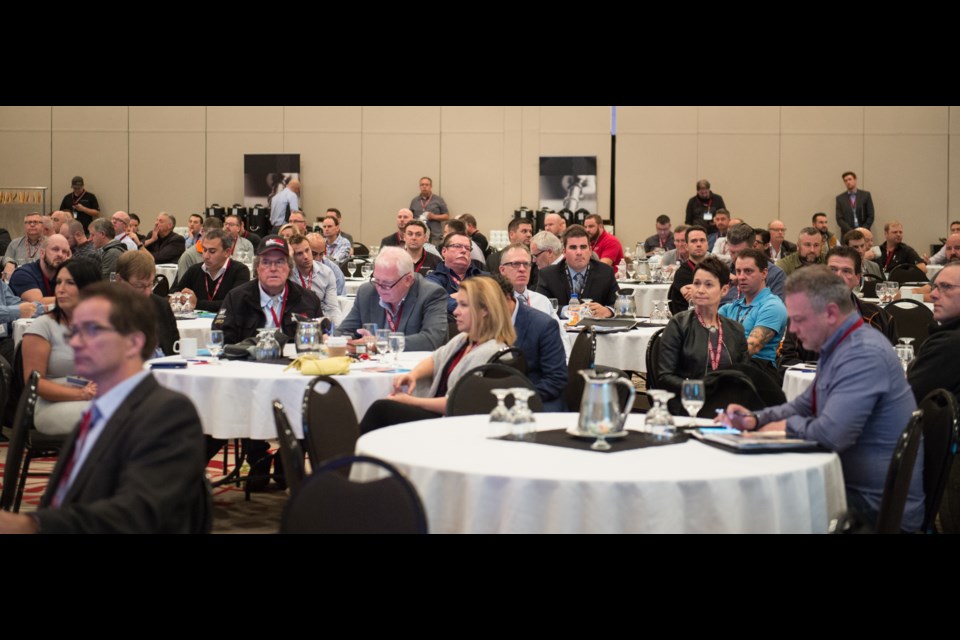Regina – For a conference whose purpose is to directly connect buyers and sellers, the 4th Annual Saskatchewan Oil & Gas Supply Chain Forum had a room full of eager participants who got their chance for some real one-on-one time.
That was evident when it came to the speed networking session, which saw procurement staff from several of the largest companies in the Saskatchewan oilpatch present. Each participant had five minutes to make their pitch or ask questions before the organizers said it was time to move on. The lines at several booths were long with interested companies.
The speed networking event was the culmination of several presentations by those large companies as well as trade show time. The general message from the speakers was “How do you do business with us? Here’s how.”
While several described somewhat arduous processes to become an approved vendor, with no promise there would be work at the end, the carrot was the fact these companies were each spending hundreds of millions of dollars per year, even billions, and they need vendors to spend that money with.
While last year’s event saw most of the presentations come from Saskatchewan’s larger oil companies, this time the two big pipeline companies featured prominently as did Federated Co-op. It was the first time the refinery had been represented on stage.
The presentations included Federated Co-operatives Limited, TransCanada, Enbridge and Schlumberger. The keynote speaker was Dean La Riviere, regional director, Western Canada for Cisco. His presentation focused on digital disruption. “We used to talk about 10-year life cycles. Now we’re talking months,” La Riviere said. “This is a massive market transition we’re talking about.”
Schlumberger Canada Limited president Celine B. Gerson also spoke.
There were presentations by the Petroleum Services Association of Canada (PSAC) and Stantec. Stantec spoke about Saskatchewan’s climate change strategy.
“I think it went well. It went very well,” said Eric Anderson of the Saskatchewan Industrial & Mining Suppliers Association Inc., the organizing group behind the event. The Government of Saskatchewan was also a part of it, and Minister of Energy and Resources Bronwyn Eyre provided greetings and some opening remarks.
“The procurement people were open to discussions and helping. The members and supply chain people had lots of good questions and wanted to know how to help them. Two groups working together, and it was a success,” Anderson said.
“We’ve got great presentations, from owners, what they want, how they do businesses, what they need, where they think the world’s going, to the best of their abilities. And they stick around for a conversation with the supply chain to explain how to work with us, here’s what we need, here’s what we don’t need,” he said.
A total of 280 attended.
While the tradeshow was about twice as big as last year, Anderson noted, “That’s about as far as we’ll go. We don’t want to have a trade show that’s so big that there’s no time to go through all of it.”
Indeed, the event had something of an intimate quality to it. The speed networking session was well taken advantage of, yet there was still enough time that participants could have spoken to each major company they were interested in. With the Keystone XL pipeline gearing up for next year, TransCanada’s group saw the longest lines, yet no one walked away without an opportunity to get their five minutes in. This was due in part to a change in the scheduling, moving the speed networking to the end of the day, and effectively leaving it open-ended. Everyone was wrapped before the scheduled end, and yet they still got their time.
A common thread through many of the presentations was prospective vendors need to start at the larger company’s website and go through the vendor portal process. Safety records and certification are key, and several of the larger companies noted their vendors need to be set up with ISNetworld, in particular, or one shouldn’t expect to be doing business with them. TransCanada stressed the need for local and Indigenous participation within vendor’s operations if they want to work for that company.



